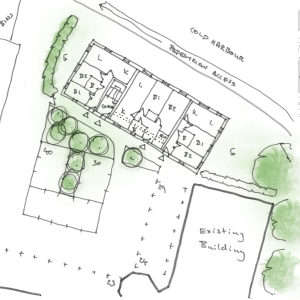
Dorset Council (former West Dorset District Council area): Darryl Howells has secured Pure Town Planning’s first approval of a new type of planning permission. Granted earlier this week, we received a planning “Permission in Principle” (PiP) for the erection of a block of 9 flats in Sherborne, Dorset.
This type of application is designed to reduce the amount of paperwork needed to be submitted from the outset and reduce the timescale for a decision. The paperwork needed to be submitted is simply the application form, planning statement and location/ site plan. Essentially the PiP is an Outline Planning Permission, but instead of giving the LPA 8 weeks to determine an application, it has 5 weeks starting from the day the application is first registered. That 5 weeks includes the statutory public consultation period of 14 days not the usual 21 days.
The National Planning Practice Guidance (NPPG) advises “The permission in principle consent route is an alternative way of obtaining planning permission for housing-led development which separates the consideration of matters of principle for proposed development from the technical detail of the development. The permission in principle consent route has 2 stages: the first stage (or permission in principle stage) establishes whether a site is suitable in-principle and the second (‘technical details consent’) stage is when the detailed development proposals are assessed.” (NPPG Paragraph: 001 Reference ID: 58-001-20180615).
In this particular case, the firm’s client Juno Developments had purchased an office building on a designated employment site protected by planning policy. The client had previously received a Prior Approval (also secured by Darryl) for the conversion of the building to 24 flats. The client then sought Darryl’s advice about how to maximise the development potential of the rest of the unused site, preferably for residential accommodation. Darryl suggested the PiP process as a formal alternative to pre-application discussions. The client then instructed LMA Architects to prepare a sketched site plan.
During the PiP process, the planning officer challenged the principle of intensification of residential units on a site reserved for employment land, however Darryl’s quick and robust response of justification soon changed the planning officer’s stance from refusal to approval.
Using the PiP process offers a speedily, cost effective and formal alternative to pre-application discussions that usually can be delayed, lacks content/ advice and has no weight in planning law. So if you have land and would be interested to know the what uses could be provided to maximise your returns, the please get in touch with Pure Town Planning.
